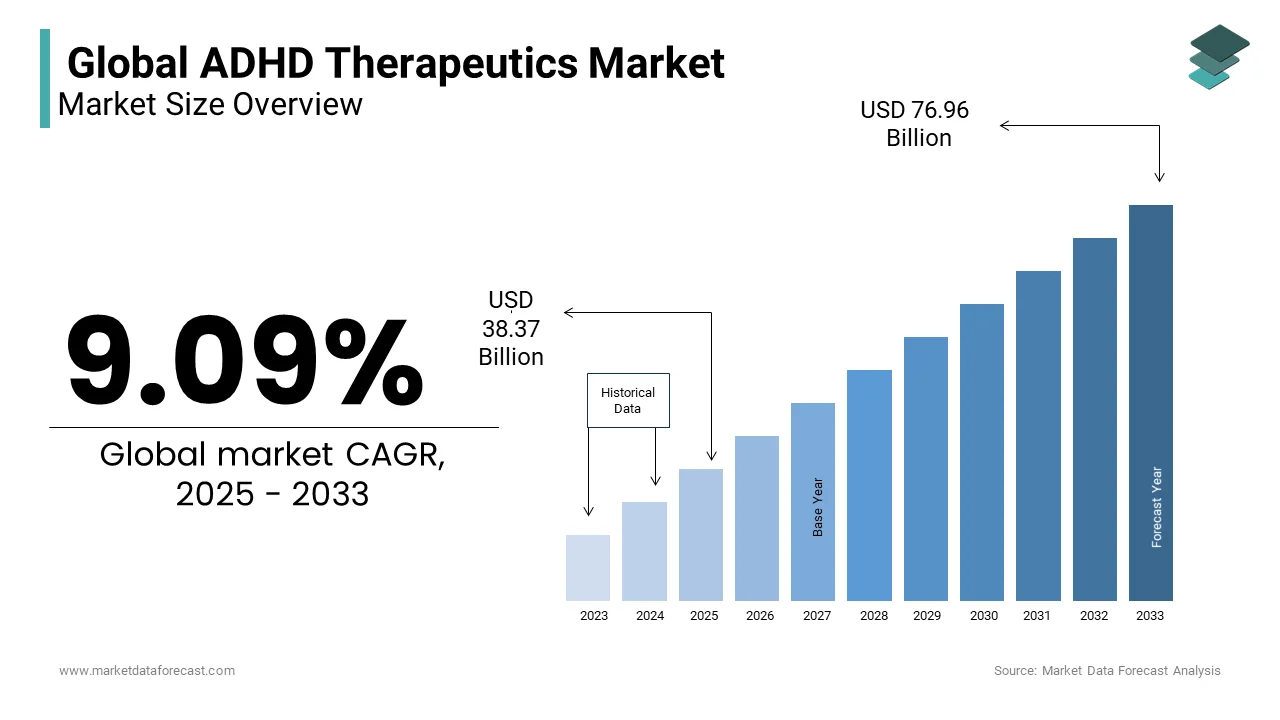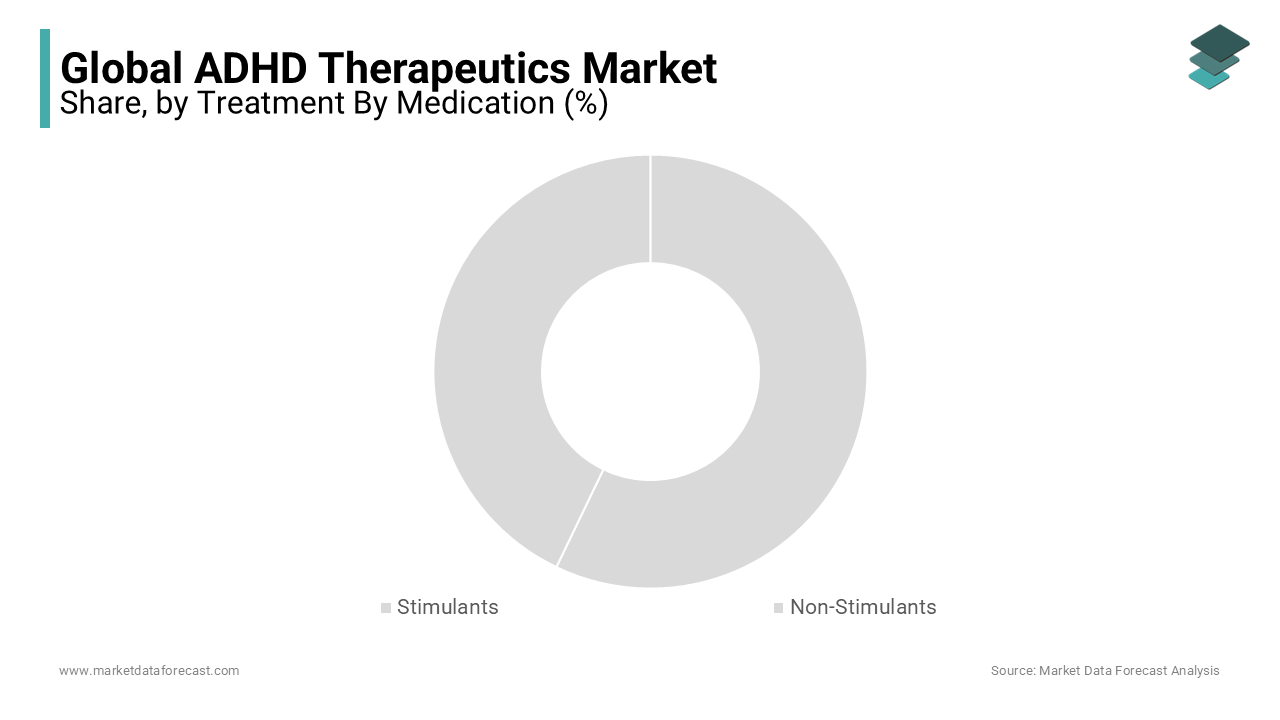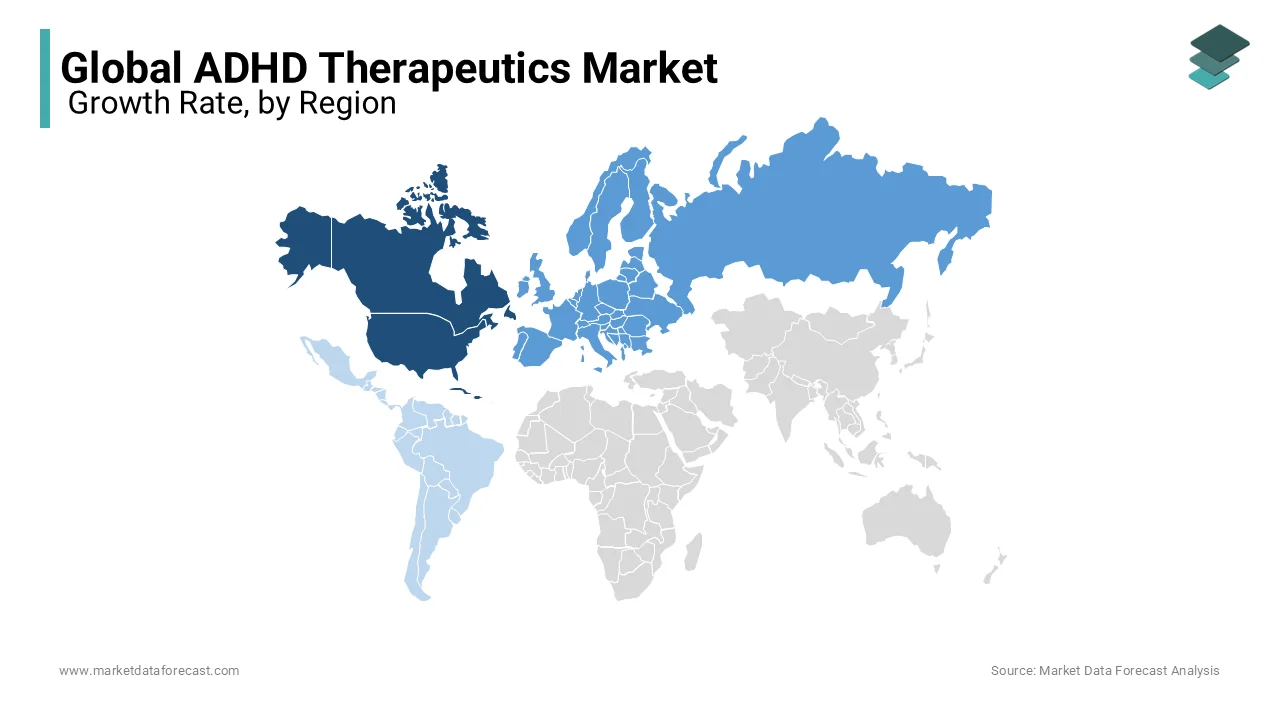Global ADHD Therapeutics Market Size, Share, Trends & Growth Forecast Report – Segmented Based on Treatment by Medication (Stimulants (Amphetamines, Methylphenidate, Dextroamphetamine and Dexmethylphenidate) and Non-Stimulants (Atomoxetine, Bupropion and Guanfacine), Psychotherapy (Behaviour Therapy, Cognitive Behavioural Therapy, Interpersonal Psychotherapy and Family Therapy), Education or Training and Region (North America, Europe, Asia-Pacific, Latin America, Middle east and Africa) - Industry Analysis (2025 to 2033)
Global ADHD Therapeutics Market Size
The global ADHD therapeutics market size was valued at USD 35.17 billion in 2024. The ADHD therapeutics market size is expected to have 9.09% CAGR from 2025 to 2033 and be worth USD 76.96 billion by 2033 from USD 38.37 billion in 2025.

Attention deficit hyperactivity disorder (ADHD) is a neurodevelopmental disorder that damages and envelops symptoms of impulsivity and hyperactivity. Treating and controlling the disease with the help of technology defines neurobehavioral because of how the brain affects learning, behavior, and emotion. Patients with this disorder suffer from a lack of concentration at work and in life. The problem may stem from childhood and grow into adulthood for several people. Having ADHD can lead to problems in a person's personal and professional life and may lead to low self-esteem and sometimes anxiety and depression. ADHD can stop an individual from exploring their full potential, and the treatment for the problem often includes drugs and talk therapy. ADHD therapeutics work on boosting the chemicals in the brain that promote focus and reduce hyperactivity to help the patients focus better. In addition, several psychological therapies help improve the attention span of these patients and may help them stabilize their condition for life.
MARKET DRIVERS
The growing incidence of attention deficit hyperactivity disorder across the world propels the global ADHD therapeutics market growth.
The causes of ADHD are still indistinct, although genetic presence is observed in many cases. As per the data given by the Centre for Disease Control and Prevention (CDC) in 2016, around 6.1 million individuals, including 388,000 children aged 2–5 years, 4 million 6–11 years, and 3 million 12–17 years, were diagnosed with ADHD in the U.S. besides, boys are more likely to be diagnosed than girls. There has been an increase in the diagnosis of ADHD due to the growing awareness regarding the condition and the rising number of people seeking healthcare for mental health. Additionally, in recent years, there has been light on the fact that ADHD can also be witnessed in adults and is quite common, as it was previously thought to be a purely child-related disorder.
The frequency of ADHD is rising at a higher rate, which drives the global attention-deficit hyperactivity disorder therapeutics market, as there is no treatment for this disorder. Furthermore, the ADHD therapeutics market is driven by the rough impact of unstable lifestyles and additives in children's diets, increasing the incidence of ADHD within the 4-to-17-year age group. Moreover, increasing awareness concerning the syndrome among physicians and patients and opinion-based due to the lack of regular diagnostic tests is anticipated to fuel the growth of the worldwide ADHD market in the coming future.
Additionally, increasing advancements in the medical field, a growing number of research in neurosciences, and raising awareness about mental illness among people are fuelling the market growth to a considerable extent. Furthermore, expanding the focus of biotechnology & pharmaceutical companies into developing innovative therapeutics for ADHD drives the growth of the global ADHD therapeutics market. The rising research in the field of new therapies supports market growth. For example, the new FDA-approved ADHD device, Monarch external Trigeminal Nerve Stimulation (eTNS) System, releases minute electric pulses in the brain, significantly reducing inattentiveness. Endeavor Rx is a digital video game made as a therapy for ADHD, and it won the approval of the FDA in 2024. In addition, an experimental non-stimulant drug by the name SPN-812 (viloxazine extended-release) made headlines in 2024 and was also published in the Journal of Clinical Therapeutics.
MARKET RESTRAINTS
Most of the side effects occur early during the treatment with ADHD medications, which will hamper the global market growth. The most common side effects of ADHD therapeutics include decreased appetite, which affects almost 80% of the people taking stimulant medications. Weight loss, difficulty sleeping, rebound effect, anxiety, tics, upset stomach, changes in the blood pressure and heart rate, and minor growth delay are the other frequently observed adverse effects of the treatment of ADHD therapeutics limiting the adoption among the patients, leading to restricted market growth. The presence of stringent regulations by the USFDA regarding the approval of the medicines and the safety and efficacy of the drugs will challenge the market players due to the complexity and time-consuming procedure. The presence of specific contraindications will limit the market expansion. The high cost of ADHD therapeutic drugs, inappropriate funding for research activities, and the limited awareness among the people, majorly across underdeveloped and emerging nations, are expected to hinder the market size growth. The increasing concerns regarding adulterated and counterfeit drugs, which show a high impact on patient health, are restraining the market growth rate. Most people are left untreated due to social and ethical issues, which may negatively affect growth.
REPORT COVERAGE
|
REPORT METRIC |
DETAILS |
|
Market Size Available |
2024 to 2033 |
|
Base Year |
2024 |
|
Forecast Period |
2025 to 2033 |
|
Segments Covered |
Based on Treatment by Medication, Psychotherapy, Education Type and Region |
|
Various Analyses Covered |
Global, Regional and Country Level Analysis, Segment-Level Analysis, Drivers, Restraints, Opportunities, Challenges; PESTLE Analysis; Porter's Five Forces Analysis; Competitive Landscape; Analyst Overview of Investment Opportunities |
|
Regions Covered |
North America, Europe, Asia Pacific, Latin America, Middle East & Africa |
|
Market Leaders Profiled |
Shire plc (Ireland), Neos Therapeutics, Inc. (U.S.), Eli Lilly and Company (U.S.), Pfizer Inc. (U.S.), Alcobra Ltd. (Israel), Supernus Pharmaceuticals, Inc. (U.S.). |
SEGMENTAL ANALYSIS
By Medication Treatment Insights

The stimulants segment is estimated to hold a major share of the worldwide market during the forecast period and is expected to grow at a promising rate. Stimulants are expected to emerge as the drugs of choice among physicians and patients worldwide. Amphetamine is also predicted to gain popularity over the forecast period. Around 70-80% of children who have ADHD use stimulants as medication to treat the disease. These stimulants help cure ADHD. In addition, these drugs act as a stimulant for the central nervous system. The most common stimulant used is Concerta (methylphenidate), Dexedrine (amphetamine), and Evekeo (amphetamine).
The non-stimulants segment accounted for the second-largest share of the global market in 2024 and with the rise in cases, the growth is expected to be positive in the future. These drugs are used to treat ADHD and are taken with stimulants and alone. Atomoxetine is recommended for patients over six years.
By Psychotherapy Insights
The behavior therapy segment is the most used method for ADHD treatment. It is an effective treatment that can help children improve their self-esteem, behavior, and self-control. It is primarily helpful with the stimulant medication going on, and we can see a reduction in drug dosage with time.Interpersonal psychotherapy is a time-limited and focused approach to treating mood disorders. Its popularity is increasing daily and is very effective in treating ADHD.Family therapy is very effective in treating ADHD, and its popularity is increasing daily.
By Education Type Insights
The parent management training segment is the most popular among others. It is incredibly efficient in treating ADHD, and the rising awareness about its effectiveness will further drive its market.Social skills training by schools and experts is also very effective in treating ADHD.School-based intervention methods are also being used more to treat ADHD, and with the rising number of cases, the method will increase quickly.
REGIONAL ANALYSIS
Geographically, the North American region commanded a share of 36.0% of the global market in 2024 and the dominance of North America is expected to continue throughout the forecast period. The growth of the North American market is driven by the growing rate of patients with attention deficit hyperactivity disorder and high healthcare expenditure. It is the reason behind the large revenue pocket of the local market in the U.S. Therefore, the region would hold its leading position in the global attention deficit hyperactivity disorder therapeutics market in the forecast period.

The European region held the second-most position in the global market in 2024, along with emerging technology and digital medicines. The rising healthcare expenditure is one of the notable factors contributing to the growth of the European market.
The Asia Pacific region is growing at a CAGR of 12.3% during the forecast period. The factors responsible for the market's growth are the unmet needs and sizeable patient population, and even the availability of lower-cost drugs for ADHD treatment. Moreover, improving the economy in the region is acting as a key to the success of pushing up the regional market and boosting the healthcare sector. Private organizations and the increased funding from the population are responsible for the regional market's growth. In addition, the explosion of healthcare insurance in many countries like Malaysia, Thailand, and Vietnam is expected to drive the ADHD market in the Asia Pacific. Also, the availability of new treatments and technology affects the growing demand and propels the growth of the regional ADHD therapeutics market.
The Latin American region is estimated to witness a prominent CAGR during the forecast period. On the other hand, the ADHD therapeutics market in the Middle East and Africa is predicted to grow at a CAGR of 9.31% during the forecast period.
KEY MARKET PLAYERS
Some of the key market players dominating the global ADHD therapeutics market profiled in the report are Shire plc (Ireland), Neos Therapeutics, Inc. (U.S.), Eli Lilly and Company (U.S.), Pfizer Inc. (U.S.), Alcobra Ltd. (Israel), Supernus Pharmaceuticals, Inc. (U.S.), Noven Pharmaceuticals, Inc. (U.S.), Novartis AG (Switzerland), Johnson & Johnson (U.S.) and Curemark, LLC. (U.S.).
RECENT HAPPENINGS IN THE MARKET
- In September 2024, Adderall is a stimulative hormone used in the treatment of ADHD (Attention-Deficit Hyperactivity Disorder); the drug is also naturally produced by the Adderall placed above the kidney and is generally addressed as (Flight or fight response drug) The overuse of this drug, which according to the article is mentioned to be increased by 10%, increases the chances of worsening mental conditions, promoting the development of depression and anxiety. Furthermore, due to the reason that 85 million people are diagnosed, Americans contributing to 45% of the augmenting prescription of this drug is becoming a matter of concern.
- In May 2024, Qelbree, a viloxazine pill, is now being prescribed to ADHD patients expecting the substitute with stimulating medications that could trigger side effects such as sleeplessness, agitation, and lack of appetite, among others. In addition, the alarming risk of drug abuse propels the need for non-stimulant drugs. The label expansion is the most recent development in the non-stimulant ADHD drug landscape as the medications production of non-stimulant treatment sores new opportunities for market growth are anticipated to improve.
- On MARCH 10, 2024, Cingulate, a Kansas-based Biopharmaceutical company, announced positive results from its new research on the effects of food on their extended-release tablet therapeutics for ADHD, the CTx-1301.
MARKET SEGMENTATION
This research report on the global attention deficit hyperactivity disorder therapeutics market has been segmented and sub-segmented based on treatment by medication, psychotherapy, education type and region.
Treatment by Medication
- Stimulants
- Amphetamines
- Methylphenidate
- Dextroamphetamine
- Dexmethylphenidate
- Non-Stimulants
- Atomoxetine
- Bupropion
- Guanfacine
Treatment by Psychotherapy
- Behavior Therapy
- Cognitive Behavioral Therapy
- Interpersonal Psychotherapy
- Family Therapy
Treatment by Education or Training
- Parent Management Training
- Social Skills Training
- School-Based Interventions
By Region
- North America
- Europe
- Asia Pacific
- Latin America
- Middle East and Africa
Frequently Asked Questions
Which segment by psychotherapy treatment type is dominating the ADHD market?
The impact of COVID-19 on the ADHD therapeutics market has been analyzed in this report and the post-purchase version of the report includes a complete analysis.
How big is the ADHD therapeutics market?
The behavior therapy segment is the most lucrative segment and also accounted for the major share of the global ADHD therapeutics market by psychotherapy treatment type in 2025.
Which are the companies playing a significant role in the global ADHD market?
The global ADHD therapeutics market size is estimated to be worth USD 35.17 billion in 2024 and USD 76.96 billion by 2033.
Related Reports
Access the study in MULTIPLE FORMATS
Purchase options starting from $ 2500
Didn’t find what you’re looking for?
TALK TO OUR ANALYST TEAM
Need something within your budget?
NO WORRIES! WE GOT YOU COVERED!
Call us on: +1 888 702 9696 (U.S Toll Free)
Write to us: sales@marketdataforecast.com
